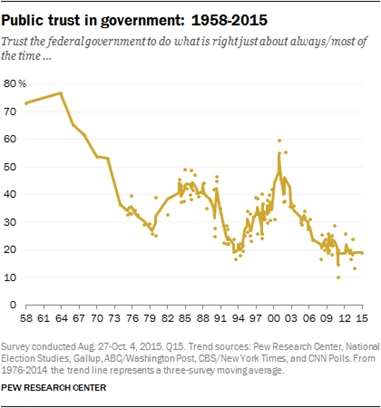World's Getting Better, but U.S. Democracy Isn't
Human progress is never guaranteed.
Of course, not all the news is positive!
Last week, I posted a typically upbeat note about the state of the world and some readers have criticized me for being too Panglossian. In fact, as I have explained in a Reason article some years ago, I do not see human progress as inevitable or irreversible. And while I am optimistic about the prospects of our species in the long run, I do not ignore short term reversals.
Take America, for example. After decades of decline, the homicide rate has risen in recent years. Similarly, life expectancy has fallen for the first time since 1993. Economically too, we are not doing particular well. It took our GDP per capita seven years (2008-2014) to recover from the Great Recession and our growth remains, by historical standards, anemic.
Relative economic decline is reversible and some of the reforms contemplated in Washington, D.C., including deregulation and tax reform, could lead to a more rapid economic expansion. A healthier job market could then help to relieve some of the desperation felt in Middle America, where mortality rates are on the rise. That would, in turn, improve overall life expectancy.
A healthy economy, however, depends on healthy institutions, and it is here that we should be very concerned. The Economist Intelligence Unit's Democracy Index evaluates countries on five categories: electoral process and pluralism, civil liberties, the functioning of government, political participation and political culture. Based on their scores, each country is then classified as one of four types of regime: full democracy, flawed democracy, hybrid regime and authoritarian regime.
The 2016 report, which was released last week, degraded the United States from a "full democracy" to a "flawed democracy." On a scale from zero to 10, "the US score has declined significantly over the life of the Democracy Index, from 8.22 in 2006 to 7.98 in 2016, pushing the US into the 'flawed democracy' category," the authors of the index wrote.
Donald Trump, the authors repeatedly stress, has not caused the decline in America's rating. But Trump has benefited from the decline in the public's trust in government. As Pew Research Center noted in 2015, the "public's trust in the federal government continues to be at historically low levels. Only 19 percent of Americans today say they can trust the government in Washington to do what is right 'just about always' (3 percent) or 'most of the time' (16 percent)."
But, as the Pew data also show, there have been two significant upticks in the people's trust in government. One followed the 9/11 attacks and quickly dissipated. The other coincided with the Reagan presidency. Paradoxically, by doing less, Reagan revived the government's flagging fortunes. If Trump succeeds in draining the swamp that is Washington, D.C., he could restore the good name of the federal government. If, as many of his opponents fear, Trump makes the swamp deeper, America's economic and institutional problems will accelerate.

